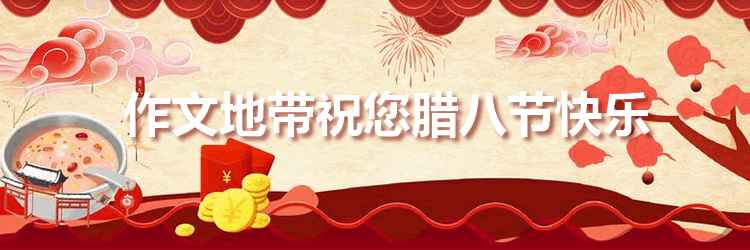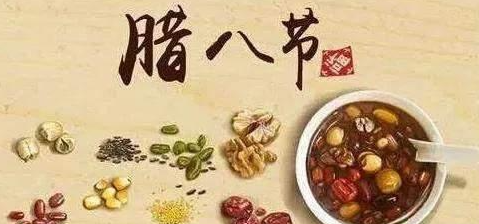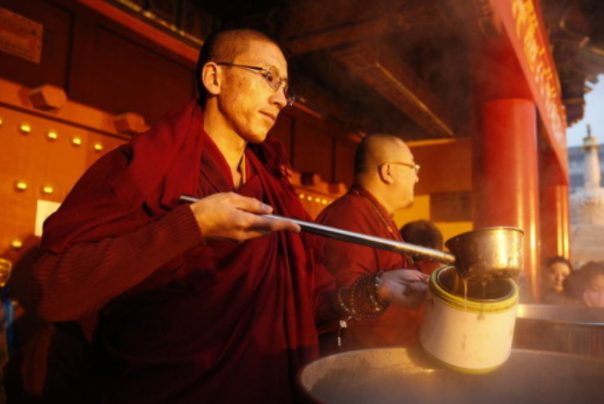今日大寒!冬将尽,春将始我们迎来二十四节气中最后一个节气【大寒】
腊八节是春节的开端,正式拉开了庆祝春节的序幕,这样重要的节日用英语怎么介绍呢?今天就来和小编一起看看吧。

腊八节由来传说
Laba Festival there are two legendary origin. Buddha Sakyamuni Buddha said that a move mountain cultivation. December eighth day that day because of hunger and fatigue Zaidao street, was a shepherdess found with large gruel saved so that he Dachedawu. Enlightenment and Buddha. One said that the Ming emperor Zhu Yuan-hour cattle to the rich because the rich bracket was broken off in a room, three days did not give anything to eat, he was unbearable hunger. Searched everywhere. Finally found a rat hole, dig out the beans, grain and other food, Zhu Chengyu consumption, find it very sweet.
腊八节的由来有两个传说。一说佛祖释迦牟尼成佛前进山修行,十二月初八这天因饥饿劳累栽倒路旁, 被一牧羊女发现,用大米粥救活,使他大彻大悟,得道成佛。一说,明朝皇帝朱元璋小时给财主放牛,因牛腿摔断被财主关在一间屋子里,3天没给饭吃, 他饥饿难忍,到处搜寻,终于发现了一个老鼠洞,从中挖掘出豆、谷等各种粮食,煮成粥食用,觉得非常香甜。
Later, the emperor made the emperor, thinking a child eat porridge and that the taste of Dayton, he ordered his eunuchs to use a variety of food cooked up a pot of sugar porridge, feast courtiers, after North Korea Wenwubaiguan emulated and passed civil society, Sui Cheng A holiday customs. By Zhu Yuan sugar porridge eighth day of the days of the twelfth lunar month, so this porridge is also called laba porridge.

后来朱元璋做了皇帝,想起小时候吃那顿粥的味道,就命太监用各种粮食煮了一锅糖粥,欢宴群臣,后朝中文武百官争相效仿并传入民间,遂成了一种节日习俗。因朱元璋吃糖粥的日子是腊月初八, 所以这粥也就叫腊八粥了。
Laba is a grand festival of Buddhism. Before the liberation around the temple for Buddha’s Birthday will be held prayers, and, like the Buddha into the Road, before the story of The Legend of chylous Munv Xian, with fragrant valley, fruit, etc. porridge worship Buddha, called laba porridge. Laba porridge and will be presented to the disciples and the believers, it would be in civil Xiangyan into the vulgar. Some monasteries in the twelfth lunar month is said to eighth day before the hand-held by the monks alms bowl, street alms, will be collected rice, chestnuts, dates, nuts and other ingredients laba porridge distributed to the poor.
“腊八”是佛教的盛大节日。解放以前各地佛寺作浴佛会,举行诵经,并效仿释迦牟尼成道前, 牧女献乳糜的传说故事,用香谷、果实等煮粥供佛,称“腊八粥”。并将腊八粥赠送给门徒及善男信女们,以后便在民间相沿成俗。据说有的寺院于腊 月初八以前由僧人手持钵盂,沿街化缘,将收集来的米、栗、枣、果仁等材料煮成腊八粥散发给穷人。
After eating legend could be the Buddha’s blessing, so poor, it is called the Buddha congee. Southern Song Dynasty, Lu You a poem that goes: at the present Buddha congee is more relative to feed, and anti-sense Emura a new section of material. Hangzhou temples temple is said to store leftovers within a stack of rice floor, usually every day the monks leftovers dried, plot a years of surplus grain to the lunar calendar laba porridge boiled eighth day he gave copies to his followers, known as Fu-zhou Ford porridge, which means that after eating you can Zengfu Zengshou. It is obvious that the monks cherish the virtues of food.
传说吃了以后可以得到佛祖的保佑,所以穷人把它叫做“佛粥”。南宋陆游诗云:“今朝佛粥更相馈,反觉江村节物新。”据说杭州名刹天宁寺内有储藏剩饭的“栈饭楼”平时寺僧每日把剩饭晒干, 积一年的余粮,到腊月初八煮成腊八粥分赠信徒,称为“福寿粥”“福德粥”意思是说吃了以后可以增福增寿。可见当时各寺僧爱惜粮食之美德。
腊八节习俗
temple寺庙施粥
According to written records,large Buddhist temples would offer it to the poor to show their faith to Buddha.
In the Ming Dynasty about 500 years ago,it became such a holy food that emperors would offer it to their officials during festivals.As it gained favor in the feudal upper class,it also quickly became popular thoughout the country.
根据有记载的历史,大的佛寺要向穷人施粥以显示对佛祖的信仰。在距今500年前的明朝,腊八粥变成了神圣的食物,就连皇帝也要在过节的时候赐粥给群臣。在封建上层社会的推动下,腊八粥迅速风靡全国。

腊八粥(Laba porridge)
The laba porridge is not only a yummy traditional rite in China to mark the laba festival but also a delicacy good for health.
腊八节喝腊八粥是中国传统习俗,腊八粥不仅好喝,对身体也十分有益。
腊八粥,表达为"laba porridge";"la"即“腊”,农历12月就是“腊月”,即"12th lunar month"。腊八就是腊月初八,这天要喝的腊八粥也称八宝粥,即"babao porridge(eight treasures)"。
腊八粥由多种食材熬制,但所用材料各地不同,主要成分包括糯米 glutinous rice,红豆 red beans,薏米 lillets,大米 Chinese sorghum,莲子 lotus seeds,枣 dates,栗子 chestnuts,核桃 walunt,杏仁 almonds,花生 peanuts等。
腊八节英语作文:
Labazhou, a kind of rice porridge, is traditionally served on the eighth day of the 12th lunar month.
Since ba, the number eight, has very good connotations in Chi-nese, Labazhou is also known as eight treasure porridge —Babaozhou.
Here eight does not necessarily mean exactly eight; it just means many.
The dish is also tasty, with its combination of colourful and sweet ingredients. Eating it is not limited to only the eighth day of the 12th month. Chinese people enjoy eight treasure porridge throughout theyear.
The common way of making Labazhou are to boil rice, millet, glutinous millet, glutinous rice, chestnuts and dried dates. Then, add peanuts, almonds, walnuts, melon - seed kernels, dried fruits and brown sugar to make the gruel not only delicious but also nutritious.
It is not certain whether Babaozhou originated in China. But one thing is for sure— the history of Labazhou can be traced back to an-cient times, when the eighth day of the 12th lunar month was consid-ered a day for animal sacrifice.
The introduction of Labazhou on this day was first observed in the Song Dynasty (960—1279), some 1,000 years ago.According to written records, large Buddhist temples would offer rice porridge, with other spices, on the eighth day of the 12th lunar month, a Buddhist festival day for followers to show their faith to Buddha.
By the Ming Dynasty (1368—1644), Labazhou had become such a holy food that it was a customary festival gift the emperors offered to their officials.
As Labazhou gained the favour of the feudal upper class, it quickly became popular throughout the country.
The ingredients used in Labazhou are unlimited. It can include anything one deems precious, nutritious, tasty or good for the health.
The recipe given just now is an average meal. However,you might also want to add red beans, pine nuts, or more expensive lotus seeds, lily,ginkgo seeds and longan.
Labazhou is billed by traditional Chinese medicine as a health food that is particularly good for the spleen, stomach and blood.
腊八节英语作文:
Legend about the origin of this festivity abounds One maintains that over 3,000 years ago sacrificial rites were held in the twelfth lunar month when people offered up their prey to the gods of heaven and earth. The Chinese characters for the hunt and the twelfth month (lie and la) were interchangeable then, and ever since la has been used to refer to both. Since the festival was held on the eighth day of the last month, people later appended the number eighth (ba in Chinese), giving us the current laba.
腊八节英语作文:
Laba is celebrated on the eighth day of the last lunar month, referring to the traditional start of celebrations for the Chinese New Year. La in Chinese means the 12th lunar month and ba means eight.
Legends about the origin of this festivity abound. One holds that over 3,000 years ago sacrificial rites called La were held in the twelfth lunar month when people offered their preys to the gods of heaven and earth. The Chinese characters for prey and the twelfth month were interchangeable then, and ever since La has been used to refer to both.
Since the festival was held on the eighth day of the Last month, people later appended the number eight (ba in Chinese), giving us the current Laba .
The majority Han Chinese have long followed the tradition of eating Laba rice porridge on the Laba Festival. The date usually falls in mid-January.







文档为doc格式

 本文地址:
本文地址: 




